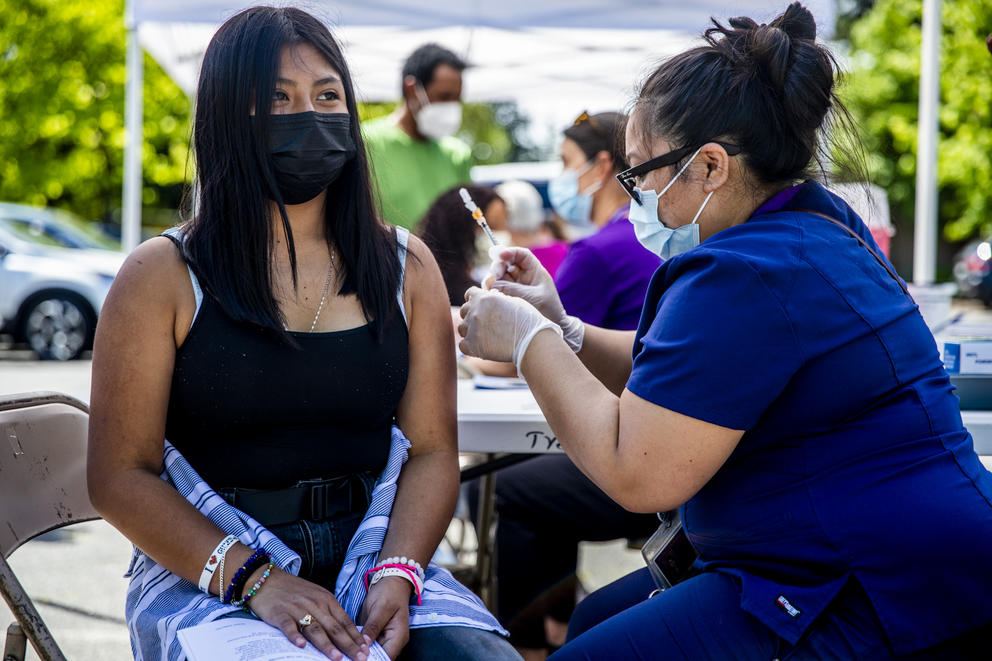“This is the time for us to pull out all those lessons we’ve learned about mask-wearing, handwashing, all the respiratory etiquette that we’ve learned before and being ready for what appears to be an increase,” said state epidemiologist Scott Lindquist at a state Department of Health media briefing last week.
Along with these habits, treatments that can help ease the symptoms, like Paxlovid, for people with certain health conditions, are now available. These developments can help keep the community healthy without returning to the mandates and requirements that were put in place during the start of the COVID-19 pandemic, officials said.
“We want to make sure that we’re really looking at the updated vaccine as one of those tools to continue to protect ourselves as we get into respiratory season,” said Umair Shah, Washington’s Secretary of Health.
Last week the FDA approved an updated COVID-19 shot, which was formulated to include omicron variant XBB.1.5. It may take medical providers in Washington several weeks to get the vaccines that they’ve ordered, but many are encouraging people to make appointments now to get prepared, said Michele Roberts, assistant secretary of prevention and community health.
“We encourage folks to be patient as providers and pharmacies across Washington start to receive access to the updated vaccine. There is going to be plenty of vaccine to go around, but it may take some time,” Roberts said.
Is the latest COVID-19 shot a booster? Do I need to get caught up?
The updated COVID-19 vaccine shot is no longer called a booster, an FDA spokesperson told CBS News last week, as health officials start the message that immunization for COVID-19 will be an annual health task, much like the messaging for the flu shot.
Health officials encourage getting annual updated shots for several reasons. The CDC says the protection given by a vaccine can weaken over time, and viruses like COVID-19 and influenza also quickly develop variants that can evade previous immunization.
For most people who get a COVID-19 shot this year, this will mean getting one updated shot, although some people with certain health conditions may be encouraged to get additional doses in the coming months, according to the CDC. People 65 and older may get an additional shot four or more months after they get their first updated COVID-19 vaccine, and those who are moderately or severely immunocompromised may get one additional shot two or more months after the last updated COVID-19 vaccine.
The CDC’s website lists different dosing recommendations for children, depending on the age of the child and the manufacturer of the vaccine.
I can’t afford a COVID-19 vaccine. What are my options?
Because the health emergency ended, the federal government is no longer providing all the COVID-19 vaccine doses for free. While many people can get vaccines through their insurance, community and federal programs can help people access the latest COVID-19 booster. Some pharmacies participate in the CDC’s Bridge Access Program, and families who cannot afford to pay might qualify for free vaccines for their children through a federal program.
Can I still get a COVID-19 home test?
Update, Sept. 22: The U.S. Department of Health and Human Services announced this week that starting Sept. 25, U.S. households can get up to four free home COVID-19 tests through COVIDTests.gov.
There are still some resources for free or low-cost testing. Many pharmacies offer home COVID antigen tests for retail sale – in some places for about $8 a test – and many doctors’ offices and pharmacies offer testing. For people without insurance, a federal program called ICATT – which stands for Increasing Community Access to Testing for COVID-19 – lists several options in Washington for free or low-cost testing sites, including at some pharmacies.
Lacy M. Fehrenbach, chief of prevention at the Washington State Department of Health, said the state is also working with schools and Educational Service Districts (ESDs) to make sure that families and students have access to rapid testing.
Even though COVID is not being tracked the same way it was at the start of the pandemic, it still is an advantage to the patient and to the community for someone with symptoms of respiratory illness to get tested and diagnosed with the correct illness, Lindquist said.
“We’ve got a lot of new tools this season, we’ve got new treatments both for COVID [and] for influenza, which really behooves people to get tested so they know what they have” and can get the right treatment and hopefully prevent community spread, he said.
What’s RSV? Do I need to get vaccinated for that?
According to the CDC, respiratory syncytial virus, or RSV, is a virus that usually causes mild, cold-like symptoms. While most people have mild symptoms and recover quickly, RSV can cause severe illness in older adults and infants. Last fall, the spread of RSV overwhelmed many children’s hospitals. A vaccine is available for adults 60 and older that can stave off severe illness. Infants and young children can have a monoclonal antibody treatment to prevent RSV.
Where can I get current information on viruses in Washington?
The state Department of Health has retired its COVID-19 dashboard. In its place is a new respiratory illness data dashboard, which provides updated information on COVID-19, influenza and RSV, including information on hospitalizations, vaccinations and more.



